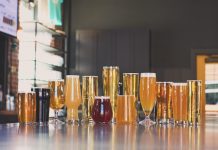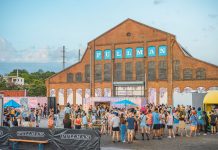
Photograph by by Dan Saelinger
Every 10 days or so, a few cases of Tropicália—a hoppy, citrusy IPA made by Creature Comforts out of Athens—arrive at Ale Yeah, a boutique beer shop in Decatur. From there, it’s moved promptly to the back of the store, out of reach and view of customers. Doesn’t matter, though; by day’s end, it’s sold out, bought by customers who know enough to ask for it.
“Even when we’re limiting it to one six-pack per person, and even when it’s not on the shelf, it still disappears immediately,” says shop owner Eddie Holley, who watched Tropicália become a sensation—a rare thing in the craft beer world. “Literally 15 people will come in every single day and ask for it. I still don’t think the demand has hit its peak, because if five cases come in, they still sell out that day.”
Jared Penso, an Athens-based craft beer rep for Savannah Distributing, has never seen a year-round beer inspire such fervor. “My Atlanta coworkers are never happy with me because I try to take the lion’s share of Tropicália for Athens,” he says. “We’ve never had a product that literally every gas station wanted to carry. Now we have these gas stations, the tiniest places 30 miles away calling us and saying they only want to carry Creature Comforts. They don’t know what an IPA is, but they know that Tropicália is popular. But there’s only so much, so our main focus is getting it to the retailers who care the most about quality.”
There are good problems and bad problems in business, and for Creature Comforts, which opened not even three years ago, the success of Tropicália, which debuted in 2014, has definitely been a good problem. Still, CEO Chris Herron and his brewmaster, Adam Beauchamp, are wrestling with the challenges posed by the beer’s popularity. Questions like “How do we make enough?” are obvious; less obvious but no less important is “What are the risks of being associated with just one particular beer?”
Tropicália is now responsible for 60 percent of Creature Comforts’ business. It has become the brewery’s flagship, even though, like most small brewers, Herron and Beauchamp had never intended to even have a flagship. Today the brewery is producing 300 barrels of Tropicália a week. (A barrel is equivalent to 31 gallons.) Gathering the right ingredients in larger quantities—like the Galaxy hops from Australia that help give Tropicália its distinctive citrusy notes—has been a challenge.
“Just because people want more doesn’t mean we can make more,” Herron says. “The reality is that the brand can only grow as fast as the raw materials will let it.”
As it is, the overwhelming demand for Tropicália ties up fermentation space, preventing the brewery from delivering on its other year-rounders, much less experimenting with new beers. (Creature Comforts’ year-round beers include Bibo Pilsner, Reclaimed Rye, and Athena, a Berliner weisse.) Herron would like to release Reclaimed Rye in cans, for example, but there’s currently no way to make it happen. Instead, he’s stuck in a tricky position: Customers want new releases, but those same customers would complain if it meant less Tropicália.
In Avondale Estates, meanwhile, Wild Heaven Craft Beers has experienced a similarly rapid ascent for its popular Emergency Drinking Beer.
After the beer hit shelves in its distinctive “caution yellow” cans, it took a mere two months for EDB to become precisely half of Wild Heaven’s overall annual output of 7,000 barrels.
“When the cans arrived, that’s when people lost their minds,” says owner Nick Purdy of the pilsner-gose hybrid. “The success of EDB changed everything about the business. Eschaton [a Belgian quad] and Invocation [a Belgian strong golden ale] are no longer year-round beers because of EDB; they’ll be around a few months at a time.”
The irony is that Wild Heaven earned its reputation by making higher-alcohol, Belgian-inspired ales. EDB is the opposite. But Purdy doesn’t see that as a problem. Not even close.
“We’re really proud of it, because even though it’s low-ABV, it’s a really creative, unique beer on multiple levels,” he says. “I think it’s crazy to complain about a hit, like when musicians and bands complain about performing a hit song. Creating a hit was your goal!”
Our picks for the next big thing
Eventide Brewing
Dry Irish Nitro Stout
Eventide’s dry, roasty stout is Atlanta’s most underrated year-round dark beer. Rich, flavorful and only 4.8% ABV, it gives Guinness a run for its money.
Scofflaw Brewing Co.
Basement IPA
Hugely juicy, with sweet citrus and tropical fruit notes exploding from the glass, Scofflaw’s new IPA is already sought-after. Watch out, Tropicália.
Abbey of the Holy Goats
Goats of the First Order
Complex, spicy and ultra-quaffable at only 4.2% ABV, this patersbier is the perfect choice for Belgian beer lovers looking for moderation.
This article originally appeared in our December 2016 issue.













